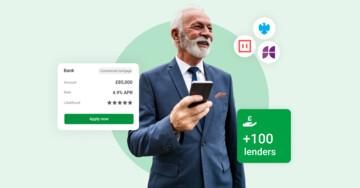As your business begins to grow, it makes good sense to stop renting your workspace and to invest in buying a property for the company. This might mean purchasing office space, buying a warehouse, or even investing in properties to rent out as a new income stream.
There are a number of reasons to invest in property or to fund new development via a limited company structure:
- Tax benefits – the interest payments you make against a commercial mortgage can be offset against your company's taxable profits.
- Lower interest rates – limited companies can often secure lower interest rates compared to sole traders or partnerships.
- Protection of personal assets – the limited liability of being incorporated protects your personal assets and finances as a company shareholder.
But to buy any property, you’re going to need to apply for a commercial mortgage. In this article we’ll look at the key steps required to finance your business property strategy
1. What is a commercial mortgage?
A commercial mortgage is a business loan you take out to purchase property or land for commercial use. It’s a way to finance your property plans and take the next step on the ladder.
The property or land you’ve purchased serves as collateral for the loan, and your business repays the loan over a set term. Interest is added at either a fixed or variable rate, depending on the terms of the mortgage agreement.
Your loan can be used for a variety of purposes. This could include buying a commercial property, refinancing your existing debt, or funding business expansion that requires new premises. The exact terms and interest rates of a commercial mortgage will vary, depending on the lender you use and the specifics of the loan agreement.
2. How much deposit is needed for a commercial mortgage?
To apply for a commercial mortgage you’ll need to make a deposit payment. The amount of this deposit will vary greatly, depending on the value of the property, your company credit rating and other risk factors. But, generally, you can expect to need a deposit of 20% to 30% of the value of the property you’re intending to buy.
Lenders will use a loan-to-value (LTV) metric to assess the risk of the loan, and the amount they’re willing to lend. LTV is calculated by dividing the loan amount by the property value, expressed as a percentage. For example, if a property is valued at £1 million and the loan amount is £700,000, the LTV would be 70%.
Lenders will generally only provide financing up to a certain LTV ratio, and a higher LTV ratio may result in a higher interest rate or stricter loan terms.
3. What types of commercial mortgages are available?
There are different types of commercial mortgage, depending on the intended use of the property your business intends to buy.
Here are a few of the common commercial mortgage types, to consider:
- Owner-occupied commercial mortgages – these are used to finance a property that will be used as the primary place of business for you, the borrower. If you’re buying an office to use as an HQ, or retail space to use as your bricks-and-mortar shop, this is the type to use. Lenders see owner-occupied mortgages as less risky, as you have a vested interest in keeping up the repayments and remaining resident in the property.
- Commercial buy-to-let mortgages – these mortgages are used to purchase a property that you intend to rent out to another commercial user. The lender will take into account the potential rental income from the property when determining loan approval and terms. This type of mortgage may have different underwriting standards compared to owner-occupied commercial mortgages and may also have higher interest rates.
- Residential buy-to-let commercial mortgages – this type of business mortgage is used to purchase a property that will be rented out on a residential (rather than commercial) basis. The lender will factor in the potential rental income from the property when deciding on terms and the approval of the loan. This kind of commercial mortgage may have higher interest rates and different underwriting standards compared to a standard residential mortgage. This is due to the investment nature of the property purchase and the higher risks involved.
- Semi-commercial mortgages – these mortgages are used to finance a property that has both residential and commercial components. This could be a mixed-use building that includes retail spaces on the ground floor and residential apartments on the upper floors. As with the previous types of mortgage, your lender will factor in both the residential and commercial aspects of the property when deciding on terms etc.
4. What can a mortgage do for your business?
Buying property is a solid investment in the future of your business. Instead of filling the pockets of a commercial landlord, you will be putting your profits into mortgage repayments. That’s a far more sensible use of your company’s money, especially in the current economic climate.
By investing in property:
- You build up property assets on your company balance sheet
- You improve your financial reputation with lenders
- You can use these property assets as collateral for your other finance needs
- You could sell the property and turn this equity into liquid cash, if needed.
5. What are the key steps to apply for a commercial mortgage?
So, you’ve decided on a property strategy for the business and know that a commercial mortgage is likely to be needed. What do you do next?
1. Assess your finances
- Review your cashflow and consider the impact of mortgage repayments
- Complete a cashflow forecast to get an idea of your future cash position
- Bear in mind the range of additional fees and costs associated with buying a commercial property
2. Create a business plan
- Define the who, what, why, how of your business, so your lender has a clear overview of your sector, your audience and what the business does.
- Demonstrate how you’ll be profitable – this is a vital consideration for lenders, as they want to be sure you can make your repayments.
3. Gather your credit reports
- You’ll need several years worth of accounts to share with your lender. This will show your financial history and current health.
- Get a business credit profile produced for the company to show your current risk rating and credit score.
4. Find a suitable property
- Think about what you need from a property. How much space do you need? What’s the best location? Will you be owner-occupier, or do you intend to rent the property out to other businesses or residential tenants?
- Make sure the property will comply with the relevant health and safety protocols.
- Create a list of your requirements before approaching an estate agent, so you can give them a comprehensive overview of what you need.
5. Connect with the right business lender
- You’ll get more from the commercial lending process by working with a specialist lender. It’s best to partner with an experienced broker – someone who knows your industry and can get you the best deal.
- Connect with our funding specialist team – talk to the Capitalise team to get the lowdown on the whole commercial mortgage process.
Other ways to finance your business property strategy
Commercial mortgages are not the only option when looking to finance your business property strategy. There are options such as development finance and bridging loans that cater to specific scenarios – and well tell you more about these other options in our next article.
If you’re looking to finance the next step in your business property strategy, Capitalise is the place to come. We have access to a network of 100+ UK lenders and a property finance team who can walk you through every stage of the mortgage process.
Get in touch to find out more about commercial mortgages.
 United Kingdom
United Kingdom  South Africa
South Africa 


